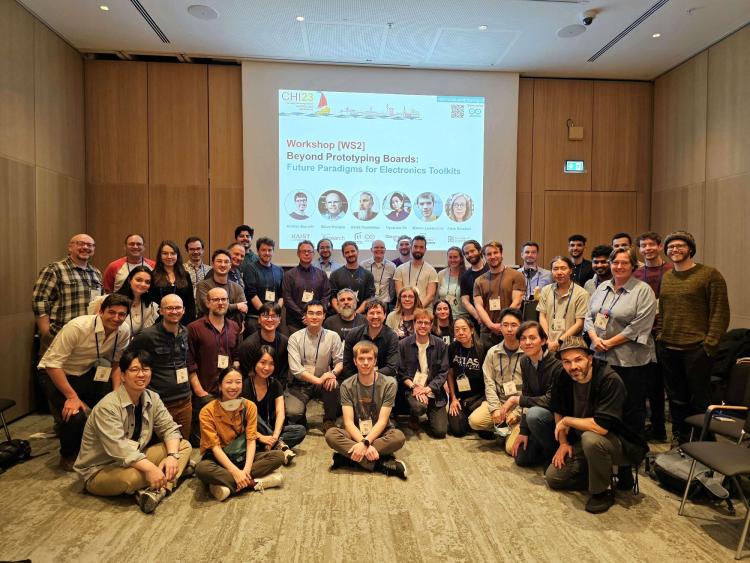ACME Lab Champions Humble Materials for Innovative Human-Computer Interactions at CHI 2023
Over the years, the computer-human interaction field has seen many trends. For a time, gesture and pen-based interactions were key, then with the rising ubiquity of smartphones came a focus on haptic technologies. Now according to Ellen Do, ATLAS ACME Lab director, “material exploration” was the theme of the day at CHI 2023, the premiere conference on computer-human interaction.
Where researchers tend to focus on advanced electronics and innovative fibers, Do champions the use of everyday components as the basis for radical creativity and invention.
At the ACME Lab, Do notes that her students consistently look to humble, easy-to-source materials like paper, cardboard and even couch cushion foam for inspiration. These ubiquitous materials are often overlooked, but they offer many possibilities for developing ingenious tools for human-computer interaction that can be printed, cut and assembled with ease.

Access to off-the-shelf tools allows ACME Lab researchers to speed the prototyping process, giving them freedom to quickly iterate and push their thinking. When paired with the advanced camera and sensor technology found in everyday smartphones and off-the-shelf electronics like microprocessors, the team has the power to create limitless forms of human-computer interaction.
The team discovered that paper markers make a viable alternative to physical circuits, requiring fewer tools and expertise to enable designers an easier path to exploring physical computing. They have built a programming library called Beholder, which empowers users to develop their own software leveraging computer vision (CV) markers. They presented this research at CHI.
Marking Material Interactions with Computer Vision
Peter Gyory (ATLAS ACME Lab member, PhD candidate), S. Sandra Bae (ATLAS ACME Lab member, PhD student), Ruhan Yang (ATLAS ACME Lab member, PhD student), Ellen Yi-Luen Do (ATLAS ACME Lab Director, Computer Science faculty member), Clement Zheng (PhD alumnus, ATLAS ACME Lab)
[video:https://youtu.be/xYf1VJoqpBQ]
Do notes that ACME Lab has focused much energy on developing platforms upon which others can build out their own ideas. Put simply, she says, “We celebrate building things to help people build things,” including useful computational tools, process documents and 3D-printed devices. It is not just about prototyping; instead, ACME Lab aims toward “iso-typing”—functional tools that empower creatives, artists and scientists to make new and better things more easily.
With the ACME Lab’s simple toolkit, designers no longer need to study advanced computer vision to use the technology. Instead of spending too much time just figuring out how to get things to work, they can focus on rapid prototyping with alternative controllers and interfaces to build their own gadgets much more quickly. Do and her team presented this concept to fellow members of the research community and global business leaders at the Beyond Prototyping Boards workshop at CHI.
It is by putting tech integrations together first and then exploring the design space that you realize more opportunities for innovation. As Do notes, “ATLAS is doing such a diverse research, which is pretty unique,” and creates more opportunities to cross-pollinate ideas and support one another’s work across the institute.
Related research presented at CHI 2023
Fabricating Paper Circuits with Subtractive Processing
Ruhan Yang (ATLAS ACME Lab member, PhD student), Krithik Ranjan (ATLAS ACME Lab member, PhD student), Ellen Yi-Luen Do (ATLAS ACME Lab Director, Computer Science faculty member)
[video:https://youtu.be/v9W9n_Lstns]
Facilitating Physical Computing with Computer Vision Markers
Clement Zheng (PhD alumnus, ATLAS ACME Lab member), Peter Gyory (ATLAS ACME Lab member, PhD Candidate), Ellen Yi-Luen Do (ATLAS ACME Lab Director and Computer Science faculty member)
[video:https://youtu.be/c_pXZIerZY0]


